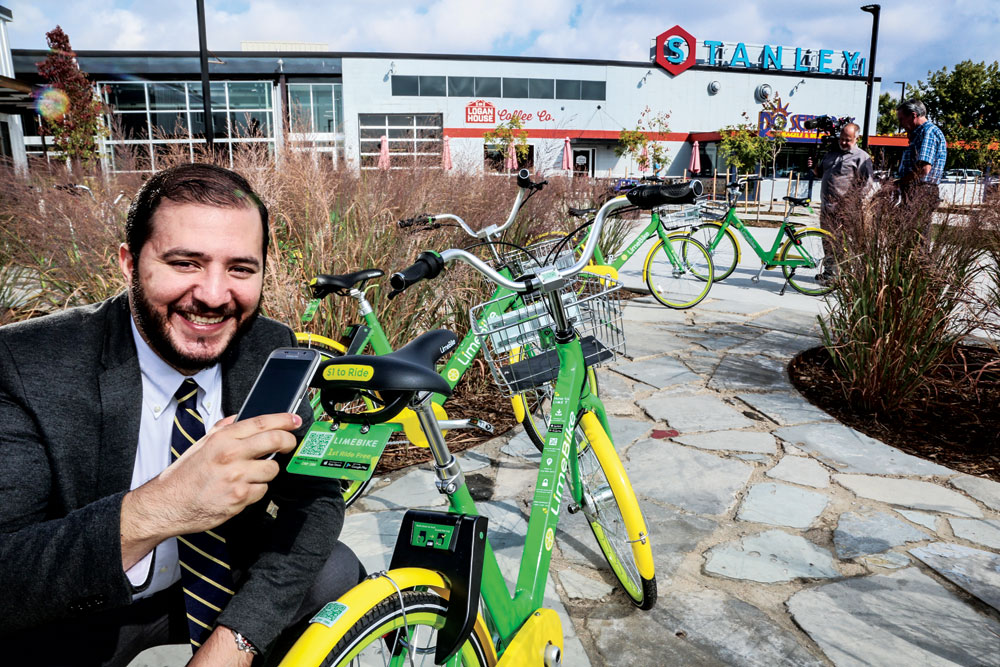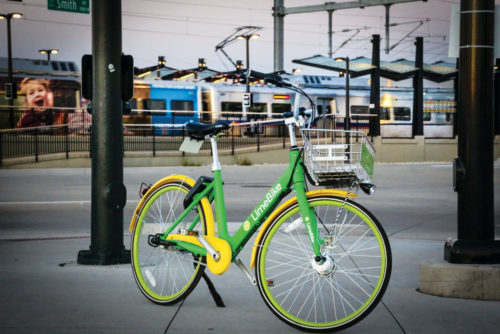
Cesar Cardona of LimeBikes shows the QR code that is scanned into the LimeBike app on the rider’s phone to unlock the bike.
At first glance, a LimeBike is unremarkable: a brightly colored three-speed comfort bike with a front-wheel basket, warning bell, head lamp, reflectors and wheel fenders. But it represents a paradigm shift in the bikesharing industry.
LimeBike is a “dockless” bikesharing service that started recently in Aurora, including at Stanley Marketplace. This is the first such dockless bikesharing program in Colorado. Unlike traditional bikesharing services such as B-Cycle in Denver, a LimeBike is not tethered to docking stations but can be picked up and left anywhere within the company’s service area. Just as with car-sharing services such as ZipCar, users download an app that locates nearby GPS-enabled LimeBikes. The rider then scans the QR code on the bike to unlock it. At the end of the ride, the bike is parked in any suitable location and secured by pressing down the back-wheel lock to finish the trip. Rides cost $1 per 30-minute time block (50 cents for students with a valid “.EDU” email address) assessed to the user’s credit card in the LimeBike app. LimeBike hopes to implement a cash-based payment system for people without credit cards.
For cities, this dockless technology eliminates the need for structures where bikes are parked and the subsidies that have typically been required to support bikesharing services. For users, there is the convenience of picking up a bike at any number of locations and leaving the bike wherever a trip happens to end. LimeBike will use data gathered from its GPS-enabled bikes to continuously “re-balance” the distribution of its bikes so that they will be located in high-demand areas.

A LimeBike left on the sidewalk at the Central Park rail station drew curious looks from passersby.
LimeBike has the potential to help solve the “first mile/last mile” problem that has long been viewed as a missing link in making mass transit trips more convenient since a rider’s ultimate destination may be one to two miles from a station. Aurora’s LimeBike program began on Oct. 6 with 250 bikes in a dockless service area focused on northwest Aurora and the nine R Line stations. LimeBike is a California-based company founded earlier this year.
Denver is evaluating the feasibility of such a program. Eric Herbst of Northeast Transportation Connections (NETC) says his organization has approached Denver to ask if the city would be interested in using Stapleton as a pilot project for introducing dockless bikesharing. Already, LimeBike bicycles have been spotted parked at the Central Park rail/bus station. (When this happens, LimeBike has to relocate the bike back to its service area in Aurora if not returned by a rider in a given amount of time.)
Bikesharing began in Paris in 2007 and since has expanded to many cities around the world. Denver was the first U.S. city to offer bikesharing at a large scale when it partnered with B-Cycle in 2008.
The system now has 89 stations and 700 bikes focused in the central core of the city. Denver subsidizes B-Cycle, with $175,000 budgeted in 2017. Public Works staffers Cindy Patton and Alyssa Alt say Denver is watching dockless systems recently deployed in Seattle and Washington, D.C., to determine whether to move forward with a program in 2018. Considerations include bike distribution and maintenance, ways to avoid excessive sidewalk congestion, and whether a dockless system could complement the station-based approach used by B-Cycle.
Aurora has granted a second dockless bikesharing permit to “ofo,” a Beijing-based company with bicycle fleets in 180 cities in 15 countries (squint at ofo and it looks like a bike rider). Ofo rides cost $1/hour.
Apps for the two Aurora services can be downloaded at www.limebike.com and www.ofo.com.
